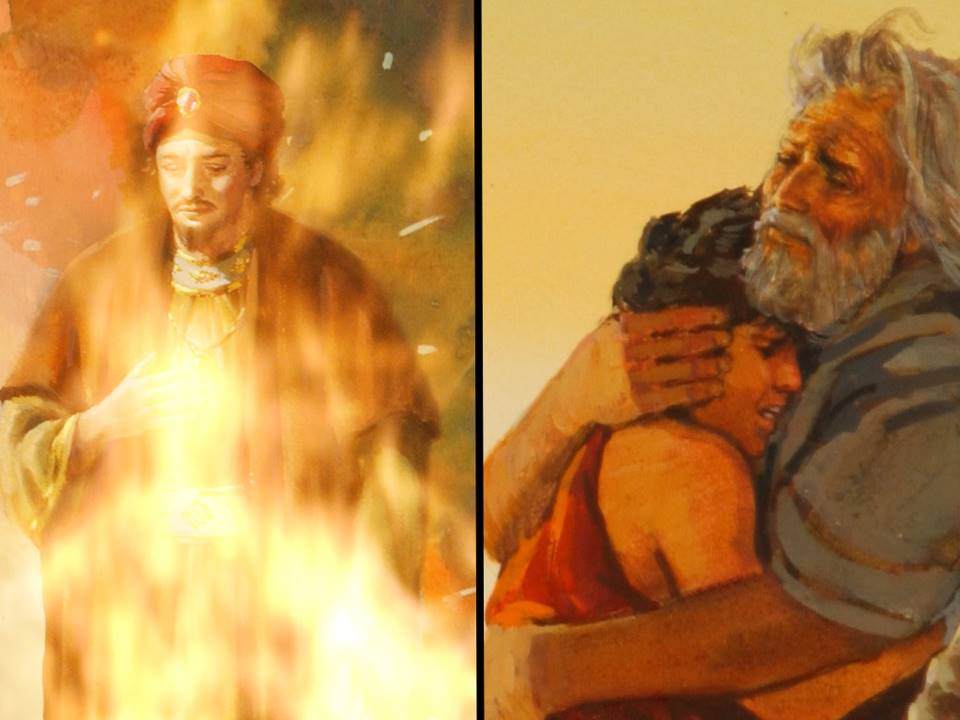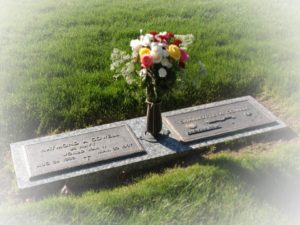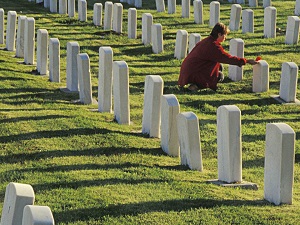LESSON 5
DON'T THE RIGHTEOUS REST IN ABRAHAM'S BOSOM WHILE THE WICKED ARE TORMENTED IN HELL AFTER DEATH?
You are welcome to another edition of Insights from God's Word, a Bible study programme that is committed to sharing God's Word by allowing the Bible to speak for itself.
In this edition, we continue with our series on The Truth About Death. In this study, I want us to consider the topic: Don't the righteous rest in Abraham's bosom while the wicked are tormented in hell after death? The topic for this study is based on the words of Christ as recorded in Luke 16:19-31. As a result of the contents of this passage in Luke, many of God's children have been led to believe that the spirits of the righteous go to rest in Abraham's bosom (a place of peace and happiness) immediately after death while the wicked are sent to the fiery flames of hell right after they die. Other Christians believe differently that the passage of Luke 16:19-31 is basically a parable that shouldn't be taken literally.
The debate on the right interpretation in regard to the passage of Luke 16:19-31 continues even today. Thus in this study, I want us to critically assess the content of this controversial passage so that we can ascertain for ourselves the true meaning of Christ's words as depicted therein. Friends, the words of Christ as recorded in Luke 16:19-31 read as follows:
"16:19 There was a certain rich man, which was clothed in purple and fine linen, and fared sumptuously every day:
16:20 And there was a certain beggar named Lazarus, which was laid at his gate, full of sores,
16:21 And desiring to be fed with the crumbs which fell from the rich man's table: moreover the dogs came and licked his sores.
16:22 And it came to pass, that the beggar died, and was carried by the angels into Abraham's bosom: the rich man also died, and was buried;
16:23 And in hell he lift up his eyes, being in torments, and seeth Abraham afar off, and Lazarus in his bosom.
16:24 And he cried and said, Father Abraham, have mercy on me, and send Lazarus, that he may dip the tip of his finger in water, and cool my tongue; for I am tormented in this flame.
16:25 But Abraham said, Son, remember that thou in thy lifetime receivedst thy good things, and likewise Lazarus evil things: but now he is comforted, and thou art tormented.
16:26 And beside all this, between us and you there is a great gulf fixed: so that they which would pass from hence to you cannot; neither can they pass to us, that would come from thence.
16:27 Then he said, I pray thee therefore, father, that thou wouldest send him to my father's house:
16:28 For I have five brethren; that he may testify unto them, lest they also come into this place of torment.
16:29 Abraham saith unto him, They have Moses and the prophets; let them hear them.
16:30 And he said, Nay, father Abraham: but if one went unto them from the dead, they will repent.
16:31 And he said unto him, If they hear not Moses and the prophets, neither will they be persuaded, though one rose from the dead."
(Luke 16:19-31)
TWO MAIN CLASSES OF INTERPRETATION
As I stated earlier, two main classes of interpretation have emanated from the passage in Luke 16:19-31. One class of interpreters suggests that the passage should be considered literally. The other class of interpreters suggests that the passage should be seen as a parable with a very important lesson. Beloved, since the Bible does not contradict itself (see John 10:35; Malachi 3:6; Titus 1:2; Hebrews 13:8), we should expect that the message found in Luke 16:19-31 about the rich man and Lazarus will present a viewpoint that harmonizes with what we have studied earlier from Scripture on the state and abode of the dead. With this fair background in place, I believe we are now ready to critically consider the two classes of interpretation before us.
THE LITERAL INTERPRETATION
In Christendom today, the popular viewpoint in regard to the passage of Luke 16:19-31 asserts that the passage is a literal account of what actually took place with two real people (that is; the rich man and Lazarus). Interpreters with such a literal perspective of this key passage in Luke 16 forward the doctrine that the spirits of the righteous dead such as Lazarus go to rest in Abraham's bosom (a place of peace and happiness), while the spirits of the wicked such as the rich man go to hell immediately after they die.
Beloved, a lot of God's children (without the knowledge we have gained on the state of the dead in this series) have been led through this passage in Luke 16 to believe that the righteous go to Abraham’s bosom (paradise) immediately after death; while the wicked dead go to the fiery flames of hell, where they are tormented forever and ever without mercy.
But friends, when we compare the basic tenets of the literal interpretation with our previous study on the condition and abode of the dead, we see a sharp contrast. While this literal view asserts that the dead are conscious after death, the Bible makes it clear that the dead do not know anything; are unconscious; and as result cannot experience joy, pain or any other emotion (Ecclesiastes 9:5-6, 10; Psalm 146:3-4). Moreover, while this literal position teaches that people either go to heaven or hell immediately after death, the Bible however makes a repeated claim that people do not immediately go to heaven or hell after death but rather sleep in their graves (Job 17:13-16; Job 7:9-10; Psalm 89:48; Psalm 30:3; Daniel 12:2; John 5:28-28) awaiting either the resurrection of life or the resurrection unto damnation depending on their works here on the earth (Ecclesiastes 12:13-14; Revelation 22:12).
Thus friends, when we compare the literal argument of Luke 16:19-31 with what we read about the dead from other portions of Scripture, it becomes clear that the literal interpretation of Luke 16:19-31 does not harmonize with Scripture, and that we must seek for an alternative interpretation that corresponds with the other numerous passages on the state and abode of the dead as depicted in Scripture.
THE PARABOLIC INTERPRETATION
At this point, I want us to consider the other interpretation which regards the passage in Luke 16:19-31 as basically a parable, yet with an eternal lesson for the people of God. Beloved, after analyzing this key passage in Luke 16, I have come to the conclusion that the account is nothing more than a parable. Here are some reasons why I'm convinced that the passage in our discussion today is just a parable with an important lesson:
1) Christ's message in Luke16:19-31 is actually the last of a chain of parables found between Luke 15 and 16. Come with me as we consider the trend: Luke 15 begins with the parable of the lost sheep. Then, the chapter continues with the parable of the lost coin, and then concludes with the parable of the lost son. Luke 16 continues the train of parables. The chapter starts off with the parable of the unjust servant, after which Christ provides some exhortations to His hearers, particularly the Jewish folks around. Immediately after these exhortations comes the last parable in the series; the rich man and Lazarus!
Friends, even though literal interpreters of Luke 16:19-31 regard all the other stories in Luke 15 and 16 as parables, yet they find it difficult to accept the contextual fact that the passage in Luke 16:19-31 is also a parable that ends the chain of other parables that was given by Christ to His listeners in succession.
Some of these literal interpreters argue that it is only in the story of the rich man and Lazarus that Christ included a real name, and as such the story cannot be parabolic but rather a literal account of what actually happened. But friends, I think this argument is simply not convincing. This is because in our varied cultural folktale stories (or parables if you like), we do make use of names as well as objects. These names or objects in our local parables do not make them any more literal than the parable of the rich man and Lazarus as depicted in Luke 16:19-21.
Some literal interpreters also come up with a second argument that since there are various meaningful conversations that are carried out in the story of Luke 16:19-31, the account cannot be parabolic. Beloved, if this point by our literal friends can be used as a good yardstick, then it presupposes that the story recorded about the meaningful conversation of various trees (see Judges 9:8-15) should also not be regarded as parabolic but rather a literal account of what actually happened. Friends, besides the answers I have given in response to these two arguments that are usually brought up by literal interpreters of our key passage in Luke 16, the highpoint I want to emphasize is that the succession of parables as recorded in Luke 15 and 16 is a clear indication that the account of the rich man and Lazarus is also a parable.
2) The Bible clearly teaches that Abraham died and was buried (Genesis 25:7-8). Friends, the Bible makes it clear that the dead (such as Abraham) do not know anything (Ecclesiastes 9:5-6, 10; Psalm 146:3-4), and that their abode is in the grave (Job 17:13-16; Job 7:9-10; Psalm 89:48; Psalm 30:3; Daniel 12:2; John 5:28-28). Now beloved, if we believe in the biblical fact that Abraham is resting in the grave awaiting the resurrection morning (see 1 Thessalonians 4:16-17), then how can we buy into a literal explanation which proposes that other dead people find their way into the dead Abraham's bosom? It is important for us to appreciate the fact that a lot of the illustrations that Christ utilized in this particular parable were based on the prevailing cultural beliefs at the time and not on Scripture. Our Lord only borrowed the well-known concepts found in the prevailing culture to enable Him carry across to His hearers a very important theological lesson. Friends, the biblical fact of Abraham's death and burial do support the stance that the passage in Luke 16:19-31 is nothing more than a parable.
3) The reward of the righteous as well as the wicked takes place after the second coming of Christ and not immediately when they die. From Revelation 22:12, we read the following: "And, behold, I come quickly; and my reward is with me, to give every man according as his work shall be." From this text and many others, it is clear that the righteous or wicked do not receive their reward immediately after they die. In fact, the righteous living as well as those who are dead still await their reward at the Second Advent of Christ (1 Thessalonians 4:16-17; Revelation 20:4; Revelation 22:12). Moreover, we read from Scripture that the wicked are reserved for fire against the day of judgement and perdition of ungodly men (2 Peter 2:9; 2 Peter 3:7). And guess what friends, this day of judgement for the wicked takes place at the end of the world and not when they die (see Matthew 13:40-42; Revelation 20:7-9). Beloved, all these scriptural texts make it clear that no dead person is going through a reward of happiness in heaven or torture in hell now. Thus, the passage in Luke 16:19-31 should be understood as a parable with an important lesson for the people of God.
4. If the entire passage in Luke 16:19-31 is to be taken literally, then the following literal yet unbiblical points can also be inferred from the passage:
A) The reward of the righteous is Abraham's bosom (Luke 16:22). However, the Bible teaches that the reward of God's people is the kingdom of God in heaven (see John 14:1-3; Matthew 5:3, 10, 11, 12; Matthew 6:19-21; Hebrews 10:34; Colossians 1:5; 1 Peter 1:3-4; Philippians 3:20-21) and not Abraham's bosom. Moreover, even if the saints were to find themselves in Abraham's bosom as is being suggested here, the question that begs for an answer is this: how big is Abraham's bosom? Will this bosom be able to contain all of God's children?
B) The only reason why Lazarus makes it to Abraham's bosom is because he was poor (Luke 16:20-22, 25). The Bible however makes it clear that the reward of people in the judgement will be based not on whether they were rich or poor but rather on their works (see Ecclesiastes 12:13-14; Matthew 25:31-46; Revelation 22:12).
C) The fact that the rich man could communicate with Lazarus and Abraham (Luke 16:24-31) suggests that those in heaven can communicate with those in hell despite the great gulf between them. The Bible however teaches differently (see Isaiah 65:17; Revelation 20:4-9).
D) The fact that the dead Lazarus could be sent to warn people on earth about the terrible place of torment (Luke 16:27-31) suggests that the dead are able to communicate with the living. The Bible however warns God's children that such practice of necromancy is an abomination to God (see Deuteronomy 8:9-12; Isaiah 8:19-20).
E) The fact that just a drop of water is needed to cool the tongue in hellfire (Luke 16:24) is basically a parabolic expression which is not based on Scripture. The Bible teaches clearly that hellfire will consume or burn up the wicked (Malachi 4:1-3; Revelation 20:7-9).
F) The story makes it clear that the rich man had bodily parts such as eyes and a tongue in hellfire while Lazarus also had a finger in heaven (Luke 16:23-24). I thought that the mainstream teaching of the literal proponents of this passage is that it is rather the disembodied spirits of the dead that go to either heaven or hell while the body goes to the grave. Now, if the statement above is correct, then why do we find Lazarus and the rich man possessing body parts in the afterlife? Friends, this inconsistency we see from the argument of our literal proponents is just another clear fact that the story in Luke 16:19-31 is nothing more than a parable.
(For a clear explanation of the biblical meaning of body, soul and spirit, please request for our previous lesson captioned: "What Happens to Man After Death")
Beloved, the points we have gone through so far bring out the clear scriptural fact that Christ's message in Luke 16:19-31 is just a parable, yet with an eternal lesson for the people of God.
ETERNAL LESSONS FROM THE PARABLE OF THE RICH MAN AND LAZARUS
From the parable of the rich man and Lazarus, we derive the following precious lessons:
1. Christ wanted to eradicate the Jewish thinking that wealth was an indication of divine favour; and that the rich were automatically making it to heaven. For instance, from the story of the rich young ruler (Mathew 19:16-26), we read about the apparent surprise of the disciples when Christ said "It is easier for a camel to go through the eye of a needle, than for a rich man to enter into the kingdom of God" (Verse 24).The disciples’ response was: "WHO THEN CAN BE SAVED?" (Verse 25; Capital Emphasis Added). From this story, it can clearly be seen how the disciples were also affected by the prevailing Jewish culture that wealth was an indication of divine favour and that the rich were closer to salvation than the poor.
In contrast to this story, we read from Luke 21:1-4 how Christ commended the righteousness of a poor widow which stood in stark contrast to the hypocrisy of the rich. Now, from these two different accounts of Scripture, it is clear that riches or poverty in themselves are not yardsticks for measuring a person's spiritual standing before God. In fact, this was one of the points that Christ wanted to drive home to His Jewish hearers through the parable of the rich man and Lazarus.
2. Besides physical riches, the Jews also saw themselves as spiritually richer than people of other nations because they were descendants of Abraham. Because of their Abrahamic heritage, they believed that salvation was theirs by birthright; and that people of other nations were far away when it came to the truth of God and His kingdom (see Matthew 3:7-9; Matthew 8:11-12).
Thus friends, through the parable of the rich man and Lazarus (which was drawn from the prevailing culture at the time), Christ wanted to help His fellow Jews to unlearn an erroneous concept that had become so ingrained in their hearts and minds. Christ's message to the Jews in Luke 16:19-31 was basically that salvation could not be obtained because one was wealthy or claimed Abraham as his Father. Rather, our Lord wanted to drive home the point that those who were to enter the kingdom of God are those who obey the Word of God as contained in the Scriptures. This pivotal point of the parable is clearly what Christ emphasized in His concluding statement in Luke 16: "...They have Moses and the prophets; let them hear them. And he said unto him, If they hear not Moses and the prophets, neither will they be persuaded, though one rose from the dead" (Luke 16:29, 31).
Exhortation: "26 For ye are all the children of God by faith in Christ Jesus. 27 For as many of you as have been baptized into Christ have put on Christ. 28 There is neither Jew nor Greek, there is neither bond nor free, there is neither male nor female: for ye are all one in Christ Jesus. 29 And if ye be Christ's, then are ye Abraham's seed, and heirs according to the promise" (Galatians 3:26-29).
In our next study, we will consider the topic: "...to be absent from the body, and to be present with the Lord.": An exposition on Paul's words in 2 Corinthians 5:8. The Bible Study references for this study are 2 Corinthians 5:8 and Philippians 1:23. Please do well to go through these study references before the next study is released.
Stay blessed and keep shining for King Jesus.
Maranatha!
Powered by White Throne Ministries














